New ‘Barcelona Metròpolis’
Barcelona Metròpolis takes on a new era. Visit the new website here >>

A longer life, social and economic changes that tear the social fabric and a more individualistic culture are the seeds of a new phenomenon: loneliness amidst the crowd. We need to respond to those who already suffer it; to be sensitive to certain social changes that may bring isolation and overburdening.

Alba is the most important synchrotron light laboratory in the Mediterranean and south-west Europe. However, it is a great unknown for Barcelona society in general.

Digital communication has greatly increased our capacity to interact with others. However, one element radically affects the relationships we can establish virtually: physical absence. They lack the empathy and all the social and personal knowledge transmitted by our bodies.

Pedro Olalla likes to stroll around the places in Athens where concepts like citizenship and participation were forged, not to retrieve them like fossils, but to remind us what our worn-out democracy could be like and isn’t. The Hellenist returned to Barcelona in May to present his latest work: a reflection on old age and the aging society.
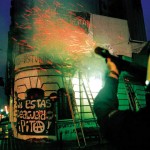
The squat at the Princesa cinema in October 1996 was the first important action to question the ‘Barcelona model’. The philosopher and activist Marina Garcés traces in her latest book the amalgam of movements that raised a radical criticism of the model and the historical story that justified it.

This cooperative was set up at the end of the Franco era to defend the workers. Today it has seven offices and more than 80 members defending the underdog in court, be they victims of asbestos or of bank abuse. Their legal crusades target the new exclusions, the growing precariousness in employment and the decline in rights and freedoms.
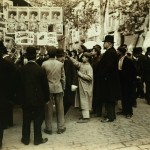
The first kiosks were built in Barcelona in the mid-19th century, either to sell products or shelter musical performances. However, the first newspaper kiosk was the initiative of an evening paper born in 1888: El Noticiero Universal. From La Rambla, newspaper kiosks spread throughout the city.
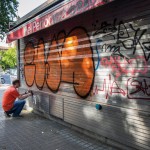
The last few years haven’t been kind to sellers of printed press. Over the course of a decade, 35% of kiosks in Barcelona have closed. The recession –and, above all, new ways of getting information– are causing many to shut down. Aware of the problem, the sector and the administration are taking on a necessary reconversion.
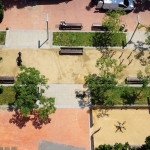
There are about 50 interior gardens open to the public in the Eixample. And in each block interior we find this reduced microcosm, each with its own particularities and features. But they all have certain things in common: spaces for leisure use, their imitation of nature and their perceptual isolation, which facilitates neighbourhood socialising.
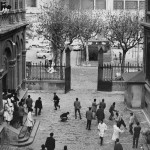
It is half a century now since May 1968 in France. In Catalonia, the unrest unleashed a frantic race to show who was the most left-wing, and could take over from the PCE-PSUC as the revolutionary party of the working class. The discourse of the counterculture, meanwhile, added a cultural and subjective dimension to the political struggle: the argument was that the revolution had to begin within each individual.

() Tres llibres inauguren la col·lecció “Biblioteca Secreta”, tres volums que recuperen personatges necessaris de la Barcelona més underground. Pep Gómez escriu sobre Pepe Otal, Joan Vinuesa narra el seu viatge a l’Índia i Xavi Cot explica què va ser el Cuc Sonat.
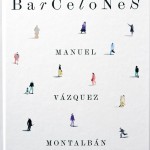
The book Vázquez Montalbán published in 1987 and which has now been republished in Spanish and translated into Catalan and English would be the ideal book because at the same time as you read it you can tour it as though it were a city.